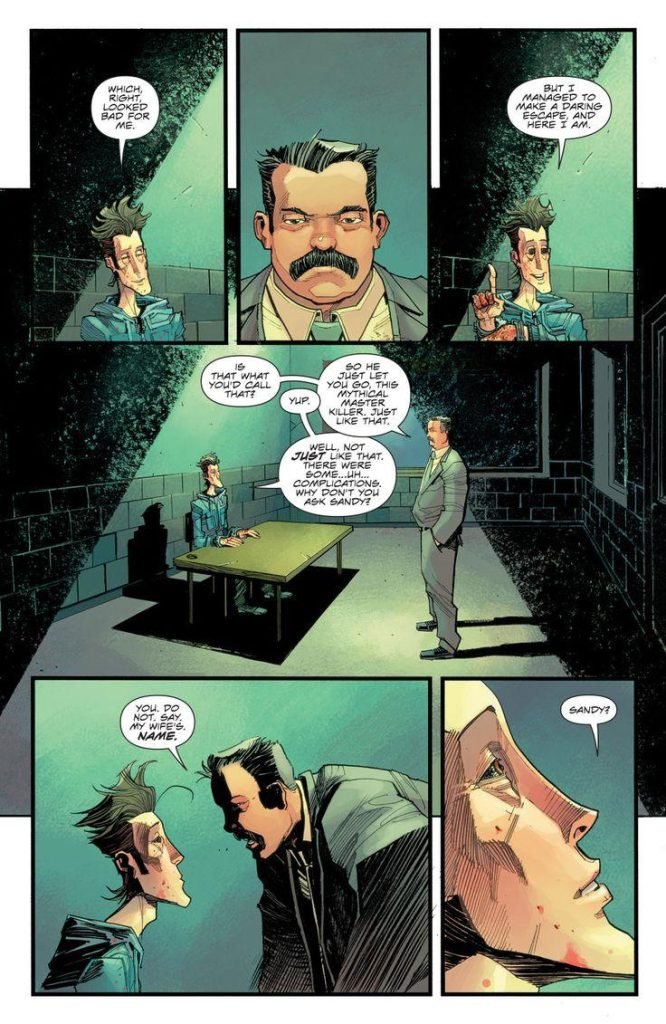Writer: Justin Jordan // Paul Jenkins
Artists: Jorge Coelho, Tamra Bonvillain // Mark Buckingham et al.
Boom! Studios 2015 // Marvel 2000

STAY AWAKE ALWAYS and see how it feels. Three days, even with good drugs to stay alert, details swirl and one starts to dream. This is the reality of JOHN FLOOD, subject of a clandestine program experimenting on human capacities, like actual US government clandestine programs now long exposed, with sinister codenames. So often, reality seeps into our fictions, and shapes our villains and heroes. In the case of John Flood, after a government agency reshaped his brain ten years ago, he never sleeps. It turns out to be not a great superpower. He needs help.

Writer Justin Jordan drew me to this title. Exquisite art by Jorge Coelho and Tamra Bonvillain held me there, unasleep, until details swirled away into disarray after three issues or so. One part stuck, face to face with the murderous villain in Issue 6, where he says, “Do you want to know my secret? How I did this, all this time? … because I didn’t need anything else. Not a home. Not friends. Just this.”
Here we see the isolated crazy guy who lacks community to get a moral bearing, let loose among us without ties, a stranger. This is the image so often portrayed of despots, serial killers, and lone gunmen: unscrupulous predators harvesting gratification from others like a vocation.

What struck me right away, though, in the statement by John Flood’s villain is how it parallels virtues for a good civil servant. A servant without a home of one’s own, no family, nor attachment to a particular community but the present one, is most likely to stay objective and loyal to work in the interests of the people served. An isolated individual is refreshed by a position with meaningful work to do. This is why eunuchs were so well trusted in harems and high positions in earlier times: they were modified not to keep them from having sex, but to keep them from having families and intimate connections that could sway their judgment and loyalties; and mostly, it worked. Religious orders often constrict personal interests similarly to shape a life of service. On the other hand, the same is true for soldiers—another kind of civil service. Perhaps, rather than defeat our bad guy, we need to focus more on getting the person a better job, before they start acting out. Isolation need not be a curse.

I would have filed this wandering thought in the stacks, except I turned next to enjoy the art of Mark Buckingham in his run drawing PETER PARKER SPIDER-MAN, and found in Issue 23, the same bad guy brought into sharper focus in the threads of the real world. The villain Typeface is a veteran of a jungle war who arrived home to be shunned as a “baby killer”; he gets a job setting type for a signmaker and finds solace in his hands-on work. Then, in the mid-1990s, everything changed as printing technology went digital. He loses his job, and resists being discarded and shunned yet again. He gets a new vocation looking for revenge. Trained as a soldier, he makes it a war.

Writer Paul Jenkins slides into the Peter Parker story, and the lives and thoughts of those around him, in easy, elegant strokes that blend perfectly into the easy, elegant art of Mark Buckingham (with inkers Dan Green, Rodney Ramos, colors Joe Rosas). Whereas the story of John Flood felt like a literary trope—pop into place a few premises, a few common themes, and prop it up—the Peter Parker story with Typeface felt like reportage on the ground, even with a weird bad guy, a monster on the side, aliens at the end, and of course, Spidey shocked by it all: I got other issues to deal with in my life, don’t you know?

Creative destruction in the economy, and in culture, may be good policy, but it does not mean we have to tolerate creative destruction of people while it happens. The nature of the villains in the two versions here spring from the same source. We ourselves made them, some part of them always alone, with unshareable experiences forged in the fear and rage, and abominations of war, both abroad and again at home. As poet Jim Morrison once jotted in his journal:
Fear The Lords who are
secret among us
These days, we may easily recognize as in the decade of jungle wars when Jim was ruminating, the secret ones among us are The Lords of War. For these souls, it seems to me, moral uplift or elimination is not necessary. Superheroes stand down. We need, rather, systematic solutions with better jobs, better hobbies (as John Flood has to fill his sleepless hours), and better opportunities for civil service than being a soldier. We can chart changes by the type of villains that appear in our comics, which presumably for years and generations to come from this dreary date, are bound to be unavoidably worse.


